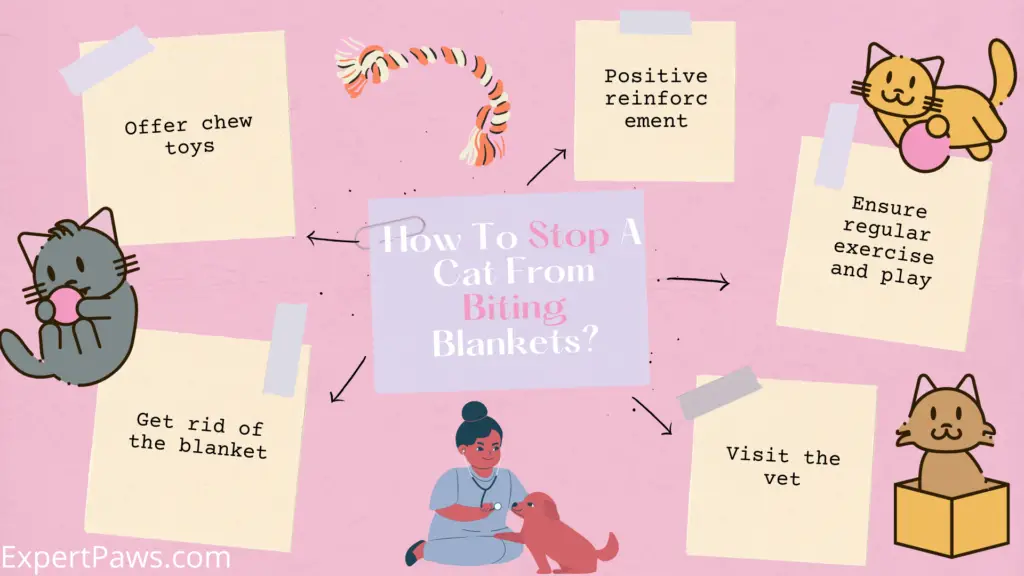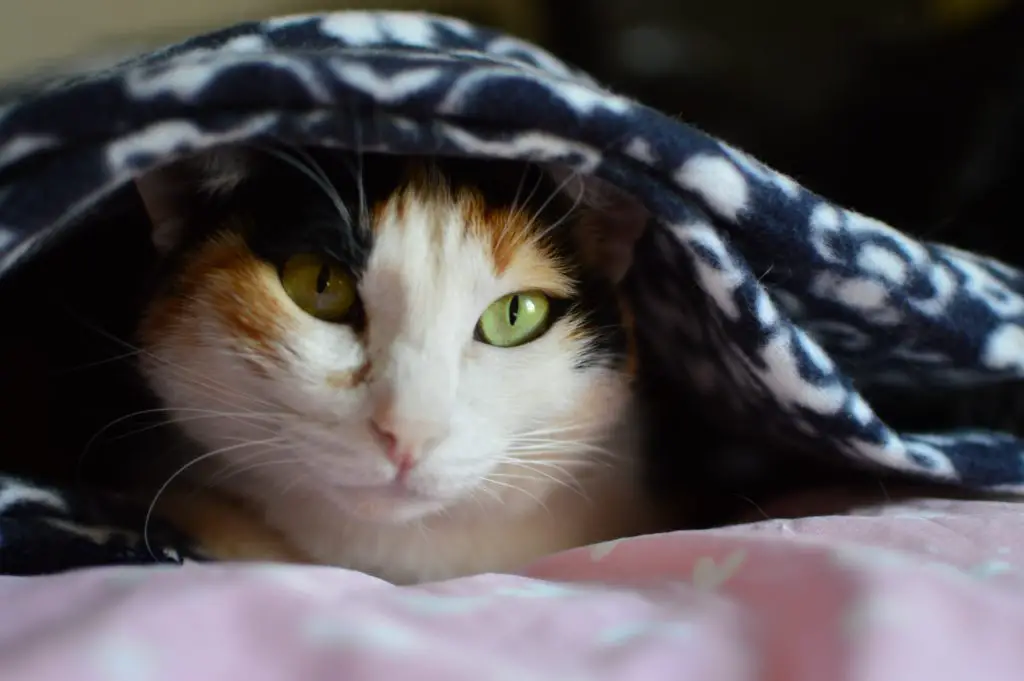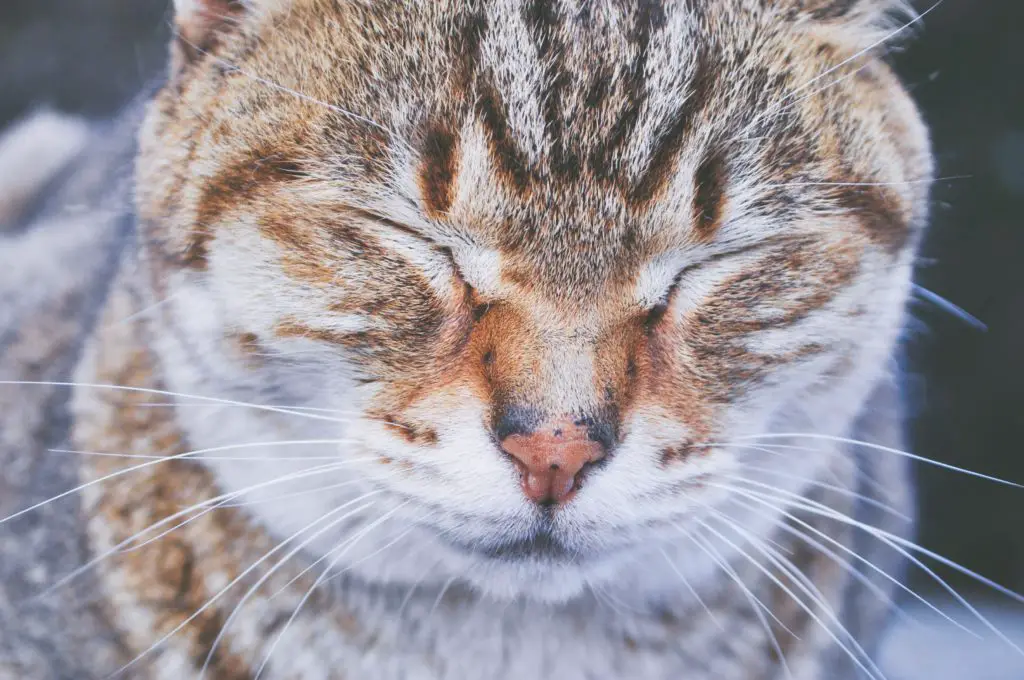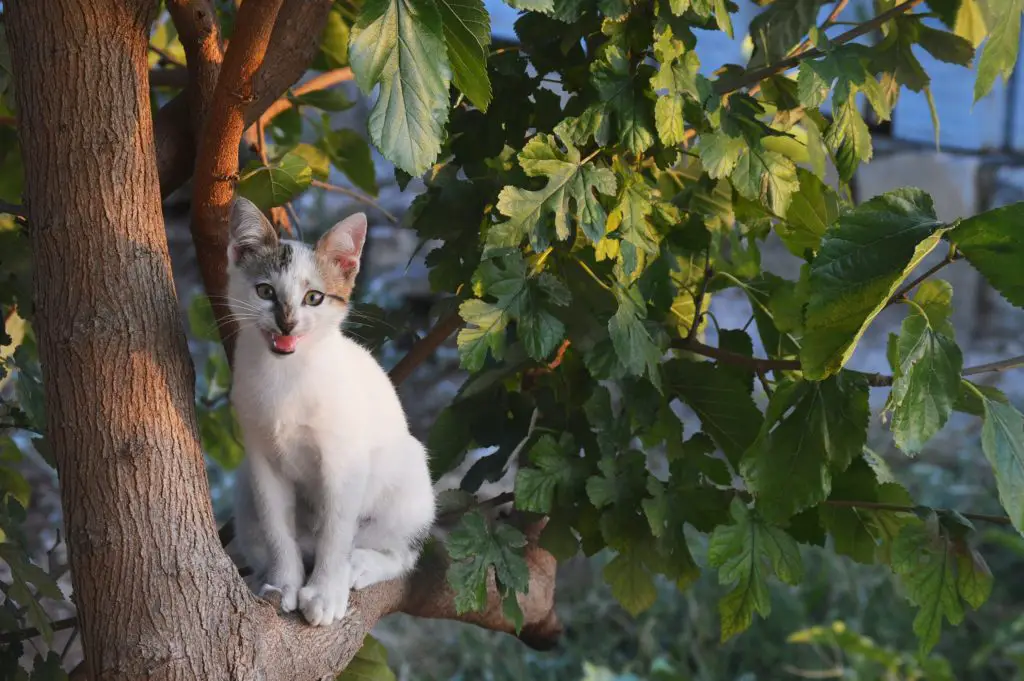The soft and comfy feeling of a small blanket definitely gives a warm and secure feeling to our feline friends.
But why do cats bite blankets? Cats often bite blankets to mark their territory by releasing their scent. Some cats also recall the kneading behavior from their early life when they suck their mother’s nipples to get milk. It means that the cat feels secure and comfortable. However, biting blankets may also be linked to stress and dental problems in cats.
Let’s get to know more about this issue and how you can stop this behavior.
Why Do Cats Bite Blankets?
Here are all the ways why cats bite blankets.

1. Nursing Instinct
Kittens suck their mother’s nipples to get milk when young. As animals and humans share a unique bond with their mothers alike, the kneading behavior gives them a comfortable and secure feeling.
Although most cats outgrow this behavior when they grow into adults, some cats don’t. In such cats, these instincts only activate when the cat gets the same feeling on another surface, and a soft blanket is the best example.
The cat will feel secure and comfortable in the blanket that will remind it of the feeding stage, and you’ll see your cat biting the blanket like it used to feed.
2. Marking territory
Like dogs, cats can be possessive about their territory and don’t like other animals coming into it. They often mark the places as their territory where they feel safe and comfortable.
The softness and warmness of the blanket give the same feeling to the cat, and it won’t like to share it. So, the cat will bite the blanket to leave its scent there. It is only to keep other animals away from the cat’s safe place.
3. Comfort
The feeling of comfort and content is often the biggest reason behind cats biting blankets. The soft texture of the blanket and its warmth make the cat comfortable, and it won’t want to leave it at any cost.
This warmth awakens their nursing instinct too, and the cat will bite the blanket to make itself relaxed.
4. Sense of security
As discussed before, cats feel safe when they’re covered with a soft and cozy blanket. Cats usually don’t like to show their belly to anyone, and they don’t feel safe sleeping just anywhere.
The warm blanket gives a sense of security, and the cat may bite it to show relaxation.
5. Genetics
Some cats have biting instincts in their genes. These cats are:
- Tonkinese
- Balinese
- Siamese
These breeds always urge to bite on soft things, and a blanket is their favorite when it comes to biting. If you have any of these breeds, your cat will just keep biting the blanket without any reason. This instinct also continues in generations.
That is why we often give stuffed toys to these cats, which they can bite to satisfy their instincts.
6. Dental problem
Sometimes, biting blankets isn’t normal or habitual.
If your cat doesn’t bite the blanket but suddenly starts this behavior, it means your feline friend needs dental care. Tooth decay or cavity may cause the teeth to ache, and the cat will bite the blanket to relieve the pain.
If you notice this behavior suddenly, consider checking the cat’s mouth and visiting the vet.
7. Pica
Pica is a psychological disorder that urges the cat to eat items other than food. Cats have a natural liking for wool, and the soft texture of the blanket is an easy target for the cat.
Cats with Pica will show aggression and may even tear apart the blanket. It’s unsafe because the cat may also swallow it, which will either result in a choking hazard or digestive issue.
8. Anxiety
Cats will not always bite blankets when they feel relaxed and comfortable. Sometimes, stress and anxiety can also encourage this behavior.
If your cat starts biting blankets suddenly, something is wrong. Your feline may be suffering from a health issue or separation anxiety.
How To Stop A Cat From Biting Blankets?
Before the biting behavior becomes a habit of your cat, it’s better to stop it to prevent it from becoming irreversible.
Here are all the methods you can use to stop your cat from biting blankets.

1. Offer chew toys
Offering chew toys to your cat is the best way to stop the cat from biting blankets. It is also beneficial for cats who bite blankets out of habit. As biting the blankets may cause the wool to go into the cat’s mouth and pose a choking hazard, chew toys are a better alternative.
Such cats only want something to bite and chew toys are made especially for destructive cats to calm their instincts without harming them.
By offering chewing toys more often, you’ll see your cat biting them and not the blanket.
2. Get rid of the blanket
Sometimes, it’s better to get rid of the thing causing the problem. Of course, if the cat sees the blanket all the time, it will urge to chew and bite it.
If the cat only bites the blankets in your room, you can stop the cat’s access to the room and hide the blankets whenever it comes there.
Alternatively, you can give it chew toys and hide the blanket too. When the cat urges to bite something and won’t see a blanket, it will go to chew toys and bite them.
3. Positive reinforcement
Positive reinforcement is always the best method of getting rid of unwanted behaviors in cats.
When you see your furry friend chewing on the blanket, you can gently take the blanket out of its mouth. If it understands commands, you can take the blanket out and say ‘’no’’.
The cat will know that biting blankets is bad behavior. An even better idea is to give treats to the cat as soon as it stops biting the blanket.
It will make the cat happy, and doing this for a few days will help the cat leave this behavior.
4. Ensure regular exercise and play
If you don’t give attention to your cat and take it out for a walk, the problem may lie here. Cats have built-up energy, which they want to get rid of, and if you don’t ensure regular exercise, the cat will find other sources, one of which is chewing the blanket.
So, it’s essential to take your cat out for a walk and play with it often. It will also treat the biting behavior occurring due to stress and anxiety.
5. Visit the vet
If your cat suddenly starts biting blankets, it’s better to visit the vet.
Your cat may have an underlying health issue like Pica or a dental problem that may encourage it to bite on blankets to relieve the pain. Cats also hide during illness, and a blanket can be the perfect covering spot for them.
A thorough checkup will help diagnose any health issue beforehand, and the vet will treat it.
Final Words
Cats biting blankets might not seem an issue at first, but it can lead to destructive behaviors, pose a choking hazard, and cause digestive problems if the cat tears the blanket and eats it.
So, you should stop this behavior before it becomes troublesome, and our tips will definitely help you out in the process!

My name is Katie, and I have had different pets at home for as long as I can remember. While I can definitely say I love all animals in general, my heart belongs to cats and dogs. I know you are supposed to choose one or the other, but I could never really decide. I’ve also owned hamsters and fish when I was a kid, and they filled my childhood with very delightful memories.





